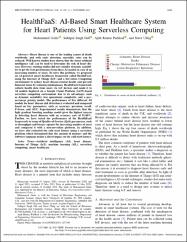| dc.contributor.author | Golec, Muhammed | |
| dc.contributor.author | Gill, Sukhpal Singh | |
| dc.contributor.author | Parlikad, Ajith Kumar | |
| dc.contributor.author | Uhlig, Steve | |
| dc.date.accessioned | 2024-01-25T08:01:31Z | |
| dc.date.available | 2024-01-25T08:01:31Z | |
| dc.date.issued | 2023 | en_US |
| dc.identifier.issn | 2327-4662 | |
| dc.identifier.other | WOS:001098109800004 | |
| dc.identifier.uri | https://doi.org/10.1109/JIOT.2023.3277500 | |
| dc.identifier.uri | https://hdl.handle.net/20.500.12573/1899 | |
| dc.description.abstract | Heart disease is one of the leading causes of death worldwide, and with early detection, mortality rates can be reduced. Well-known studies have shown that the latest artificial intelligence (AI) can be used to determine the risk of heart disease. However, existing studies did not consider dynamic scalability to get the best performance from these AI models in case of an increasing number of users. To solve this problem, we proposed an AI-powered smart healthcare framework called HealthFaaS, using the Internet of Things (IoT) and a Serverless Computing environment to reduce heart disease-related deaths and prevent financial losses by reducing misdiagnoses. HealthFaaS framework collects health data from users via IoT devices and sends it to AI models deployed on a Google Cloud Platform (GCP)-based serverless computing environment due to its advantages, such as dynamic scalability, less operational complexity, and a pay-as-you-go pricing model. The performance of five different AI models for heart disease risk detection is evaluated and compared based on key parameters, such as accuracy, precision, recall, F-Score, and AUC. Experimental results demonstrate that the light gradient boosting machine model gives the highest success in detecting heart diseases with an accuracy rate of 91.80%. Further, we have tested the performance of the HealthFaaS framework in terms of Quality-of-Service (QoS) parameters, such as throughput and latency against the increasing number of users and compared it with a non-serverless platform. In addition, we have also evaluated the cold start latency using a serverless platform which determined that the amount of memory and the software language makes a direct impact on the cold start latency. | en_US |
| dc.description.sponsorship | Ministry of National Education - Turkey | en_US |
| dc.language.iso | eng | en_US |
| dc.publisher | IEEE | en_US |
| dc.relation.isversionof | 10.1109/JIOT.2023.3277500 | en_US |
| dc.rights | info:eu-repo/semantics/openAccess | en_US |
| dc.subject | Artificial intelligence (AI) | en_US |
| dc.subject | heart disease | en_US |
| dc.subject | Internet of Things (IoT) | en_US |
| dc.subject | machine learning (ML) | en_US |
| dc.subject | serverless computing | en_US |
| dc.subject | smart healthcare | en_US |
| dc.title | HealthFaaS: AI-Based Smart Healthcare System for Heart Patients Using Serverless Computing | en_US |
| dc.type | article | en_US |
| dc.contributor.department | AGÜ, Mühendislik Fakültesi, Bilgisayar Mühendisliği Bölümü | en_US |
| dc.contributor.authorID | 0000-0003-0146-9735 | en_US |
| dc.contributor.institutionauthor | Golec, Muhammed | |
| dc.identifier.volume | 10 | en_US |
| dc.identifier.issue | 21 | en_US |
| dc.identifier.startpage | 18469 | en_US |
| dc.identifier.endpage | 18476 | en_US |
| dc.relation.journal | IEEE INTERNET OF THINGS JOURNAL | en_US |
| dc.relation.publicationcategory | Makale - Uluslararası Hakemli Dergi - Kurum Öğretim Elemanı | en_US |


















